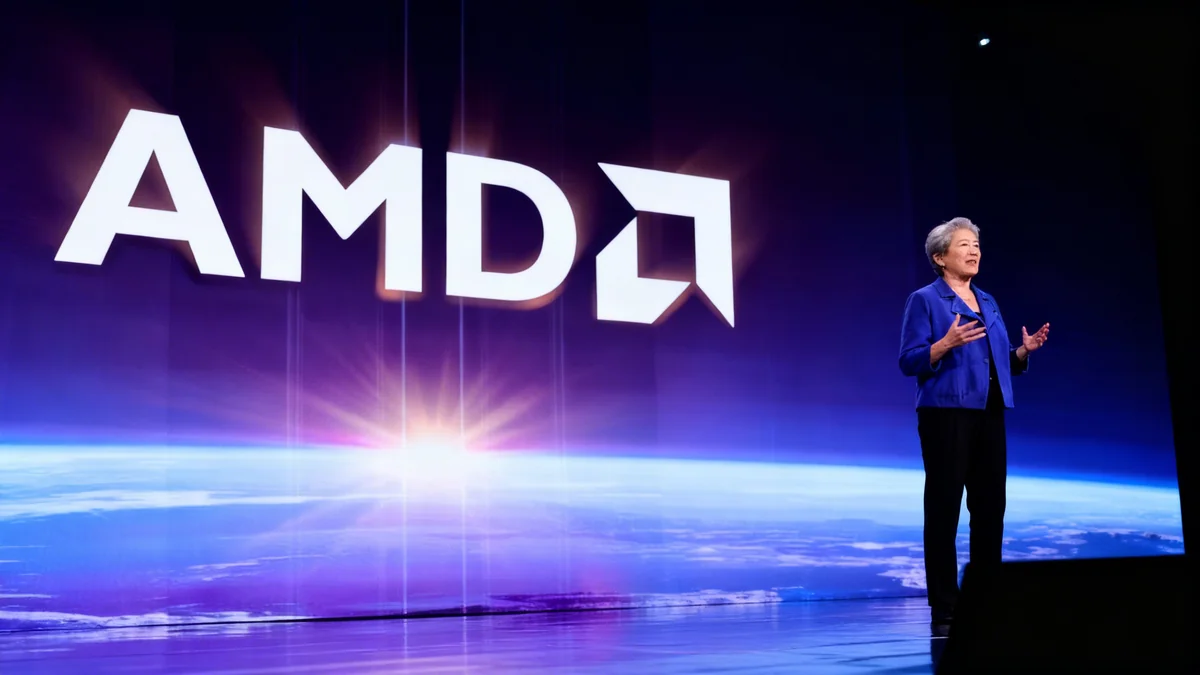Wall Street experienced a divided day on Monday as a surge in artificial intelligence stocks pushed the Nasdaq Composite higher, while the Dow Jones Industrial Average fell amid broader market concerns. The S&P 500 managed a slight gain, inching closer to its recent all-time high, primarily supported by the strength of a few technology giants.
The Nasdaq Composite climbed 0.5%, and the S&P 500 edged up 0.2% to close at 6,851.97. In contrast, the Dow Jones Industrial Average dropped 226 points, or 0.5%, settling at 47,336.68, reflecting weakness in more traditional sectors of the economy.
Key Takeaways
- The Nasdaq Composite rose 0.5%, driven by significant gains in major AI and technology companies.
- The Dow Jones Industrial Average declined by 0.5% as the majority of stocks in the S&P 500 fell.
- Nvidia and Amazon were the top contributors to the S&P 500's modest gains.
- A weak U.S. manufacturing report and corporate acquisition news created mixed signals for investors.
Technology Sector's Unstoppable Momentum
The driving force behind Monday's market split was the continued investor enthusiasm for companies at the forefront of artificial intelligence. Nvidia was once again the market's most influential stock, rising 2.2%. This latest jump brings the chipmaker's staggering year-to-date gain to 54.1%.
Amazon also played a crucial role, rallying 4% to become the second-strongest force lifting the market. The surge followed the announcement of a massive $38 billion agreement with OpenAI. Under the deal, OpenAI will utilize Amazon's cloud computing services to power its demanding AI workloads, signaling a major win for Amazon Web Services (AWS).
The positive sentiment rippled through the AI ecosystem. AI cloud service provider IREN saw its stock jump 11.5% after securing a $9.7 billion contract with Microsoft. The agreement provides Microsoft with access to some of IREN's coveted Nvidia chip capacity.
AI Darling's Continued Rise
Palantir Technologies, a data analytics firm heavily involved in AI, rose another 3.3%. The company entered the day with an impressive 165% gain for the year, with traders pushing its value higher just hours before it was scheduled to report its quarterly earnings.
Broader Market Faces Headwinds
While tech stocks soared, other areas of the market showed significant signs of strain. The drop in the Dow was partly influenced by major corporate news that unsettled investors.
Kimberly-Clark, the consumer goods company, experienced a sharp 14.6% decline in its stock price. The drop came after it announced plans to acquire Kenvue in a deal valued at $48.7 billion. Conversely, Kenvue, which owns brands like Tylenol and Band-Aids, saw its shares jump 12.3% on the news.
Another notable decliner was Beyond Meat. The plant-based meat company's stock tumbled 16% after it delayed the release of its latest quarterly results. The company stated it needed more time to evaluate a non-cash charge related to previously disclosed asset issues.
The 'Meme Stock' Rollercoaster
Beyond Meat's recent performance highlights the volatility of so-called "meme stocks." Last month, its stock price surged nearly 600% in just three days, rising from 52 cents to $3.62. This movement was largely driven by online hype and social media discussion rather than fundamental changes in the company's business outlook.
Economic Data Paints a Mixed Picture
Underlying the market's performance were fresh economic reports that raised concerns about the health of the U.S. economy. A report from the Institute for Supply Management indicated that U.S. manufacturing activity shrank more than economists had anticipated last month.
Several manufacturers surveyed for the report cited President Donald Trump's tariffs as a source of financial pressure and uncertainty. This sentiment suggests that trade policies are continuing to impact business operations and planning.
"Wonder has turned to concern regarding how the tariff threats are affecting our business. Orders are down across most divisions, and we’ve lowered our financial expectations for 2025."
A chemical products manufacturer quoted in the ISM survey
In the bond market, the yield on the 10-year Treasury note dipped slightly to 4.10%, a subtle shift that can indicate investor demand for safer assets amidst economic uncertainty.
Earnings Season vs. Bubble Fears
Despite some economic weakness, the current corporate earnings season has been largely positive. According to data from FactSet, four out of every five companies in the S&P 500 that have reported so far have exceeded analysts' profit forecasts.
With about two-thirds of reports in, S&P 500 companies are on pace to deliver profit growth of nearly 11% compared to the same period last year. This strong performance is crucial for justifying the high valuations of many stocks, particularly in the tech sector.
However, the rapid ascent of AI stocks has also fueled a growing debate. Critics have raised concerns that the market, and AI stocks specifically, have become overvalued and may be inflating a bubble similar to the dot-com bust of 2000. For now, strong earnings are helping to counter those fears.
A Look at International Markets
Overseas, stock market performance was varied. European indexes were mixed, while markets in Asia finished on a stronger note.
South Korea’s Kospi index was a standout performer, jumping 2.8% to reach a new record high. Chipmaker SK Hynix was a major contributor, soaring nearly 11%. The rally was fueled by recent announcements of a partnership with Nvidia to develop the country's AI infrastructure, further underscoring the global impact of the AI boom.





